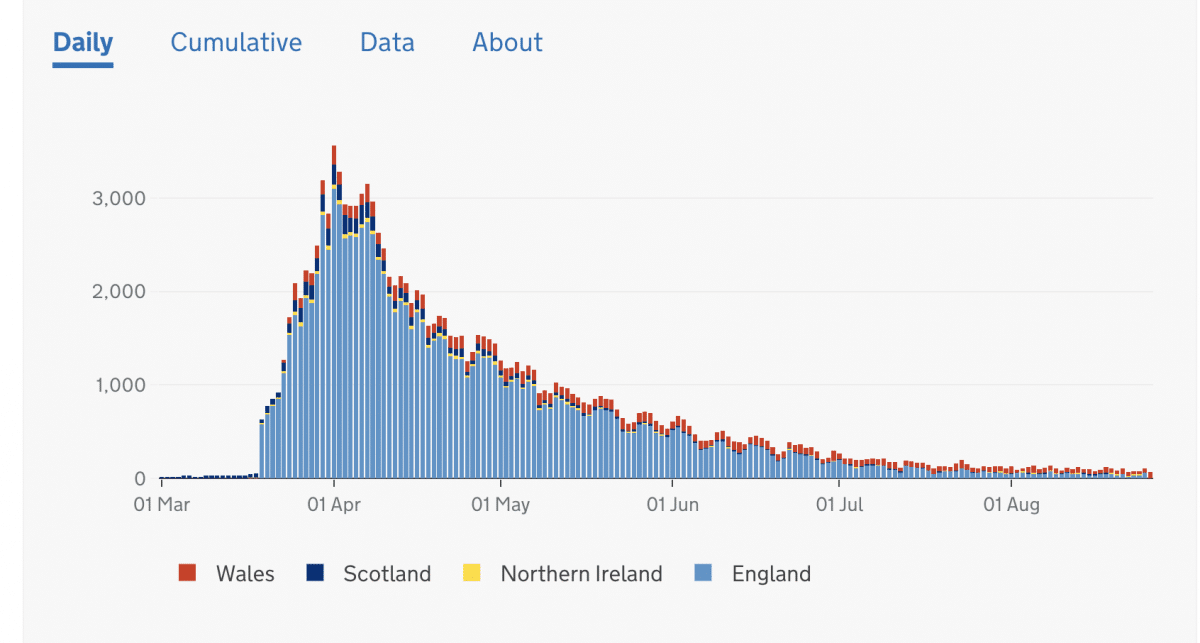The Flaw in the reporting of Welsh data on Covid Hospital admissions
August 28, 2020
Carl Heneghan
 NHS Wales CEO Response at the end of the article
NHS Wales CEO Response at the end of the article
The UK government’s website produces data on cases, admissions and deaths daily for the devolved nations of the UK (see Staging data)
Yet the data in Wales for patients admitted to hospital is concerning. The number of patients admitted in Wales is higher than in England on several days? (see the table)
How can this be? The population of England is 18 times greater (56 Million) than the 3.1 million people who live in Wales. Also, the number of patients in hospital in Wales is one-tenth that of England. (see the second table) Likewise, ICU beds in Wales are also one-tenth that of England. (see here for the data)
The gov.uk site informs me that the “figures are not comparable as Wales include suspected COVID-19 patients while the other nations include only confirmed cases.”
This weakness in the data makes comparisons impossible; it also creates concerns about the overall accuracy of the data provided by the gov.uk site. The number of patients admitted in Wales with covid is, therefore, inflated.
In the about section, we are told that “the numbers of admissions are not comparable with other nations.” Data should, therefore, not be combined if the criteria differ. But in the daily figure, it is. Does the problem highlight a lack of epidemiological understanding about creating accurate and consistent data?

Suspected COVID cases will vary substantially depending on the centre and the criteria used. Furthermore, admissions data would be more helpful if it provided a breakdown on numbers of new infections, past infections and those infected whilst an inpatient. It currently does not.
There is an urgent need to provide robust hospital admission data, not least because this information will be used as a future driver of mitigation strategies in local areas.
Given the flaws in the gov.uk data on patients admitted to hospital, the current reporting should come with a warning.
| Date |
England daily |
Wales daily |
England total |
Wales total |
| 24-08-2020 |
41 |
36 |
113,385 |
13,644 |
| 23-08-2020 |
44 |
26 |
113,344 |
13,608 |
| 22-08-2020 |
25 |
39 |
113,300 |
13,582 |
| 21-08-2020 |
49 |
54 |
|
|
| Date |
England daily |
Wales daily |
| 26-08-2020 |
442 |
N/AData not currently available for this metric. |
| 25-08-2020 |
459 |
48 |
| 24-08-2020 |
474 |
50 |
| 23-08-2020 |
474 |
51 |
Authors
Carl Heneghan is Professor of Evidence-Based Medicine, Director of the Centre for Evidence-Based Medicine and Director of Studies for the Evidence-Based Health Care Programme. (Full bio and disclosure statement here
Disclaimer: the article has not been peer-reviewed; it should not replace individual clinical judgement, and the sources cited should be checked. The views expressed in this commentary represent the views of the authors and not necessarily those of the host institution, the NHS, the NIHR, or the Department of Health and Social Care. The views are not a substitute for professional medical advice.
Response from CEO of NHS Wales, Dr Andrew Goodall
“We have remained transparent about what’s included in our COVID-19 data.
“Whilst we recognise there is a need to separate confirmed cases for comparative purposes and surveillance, we have the advantage of a complete data set which shows the real underlying pressures on beds, systems and our NHS – whether cases are confirmed or suspected.
“We’re revisiting discussions with our partners, including NHS Wales Informatics Service (NWIS) and Public Health Wales, about separating confirmed and suspected cases now that we’re in a position within this pandemic to further progress the data we receive.”

